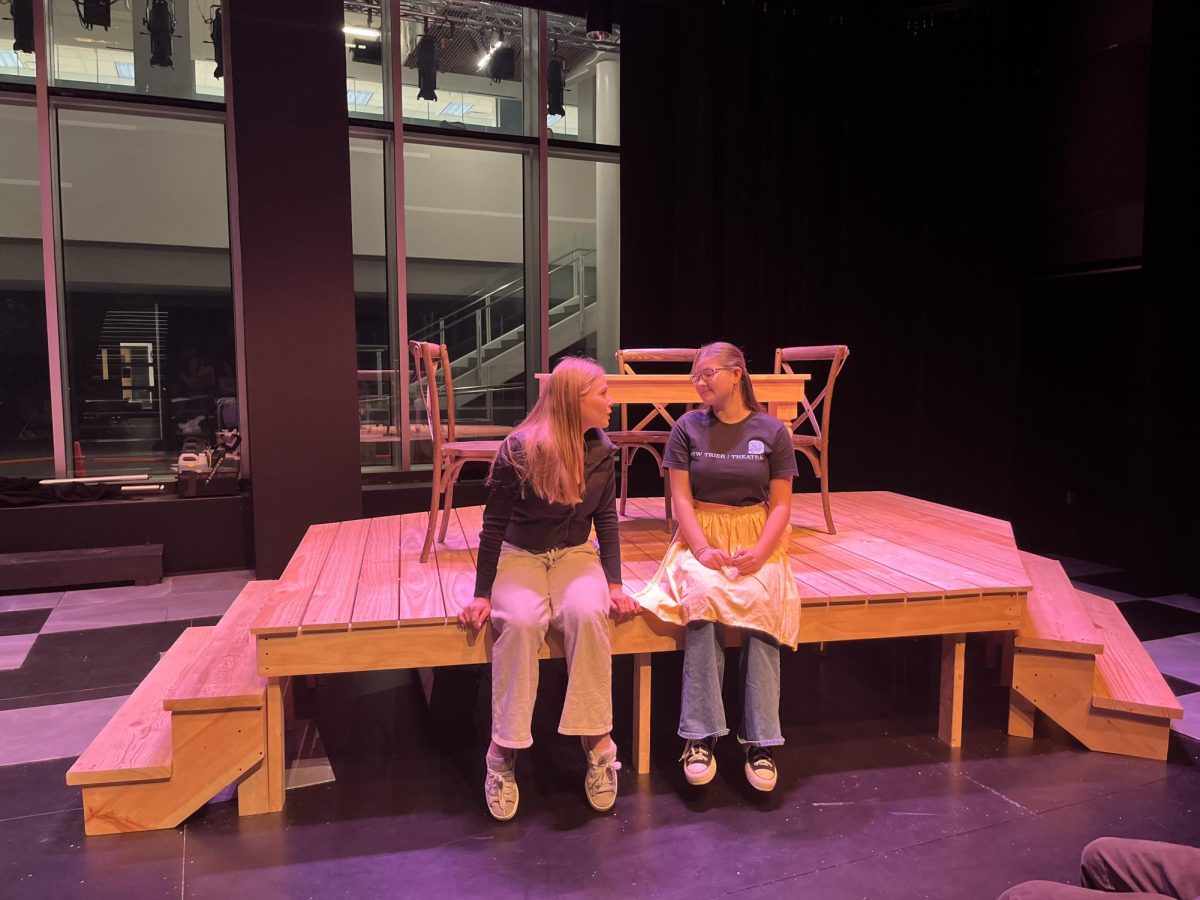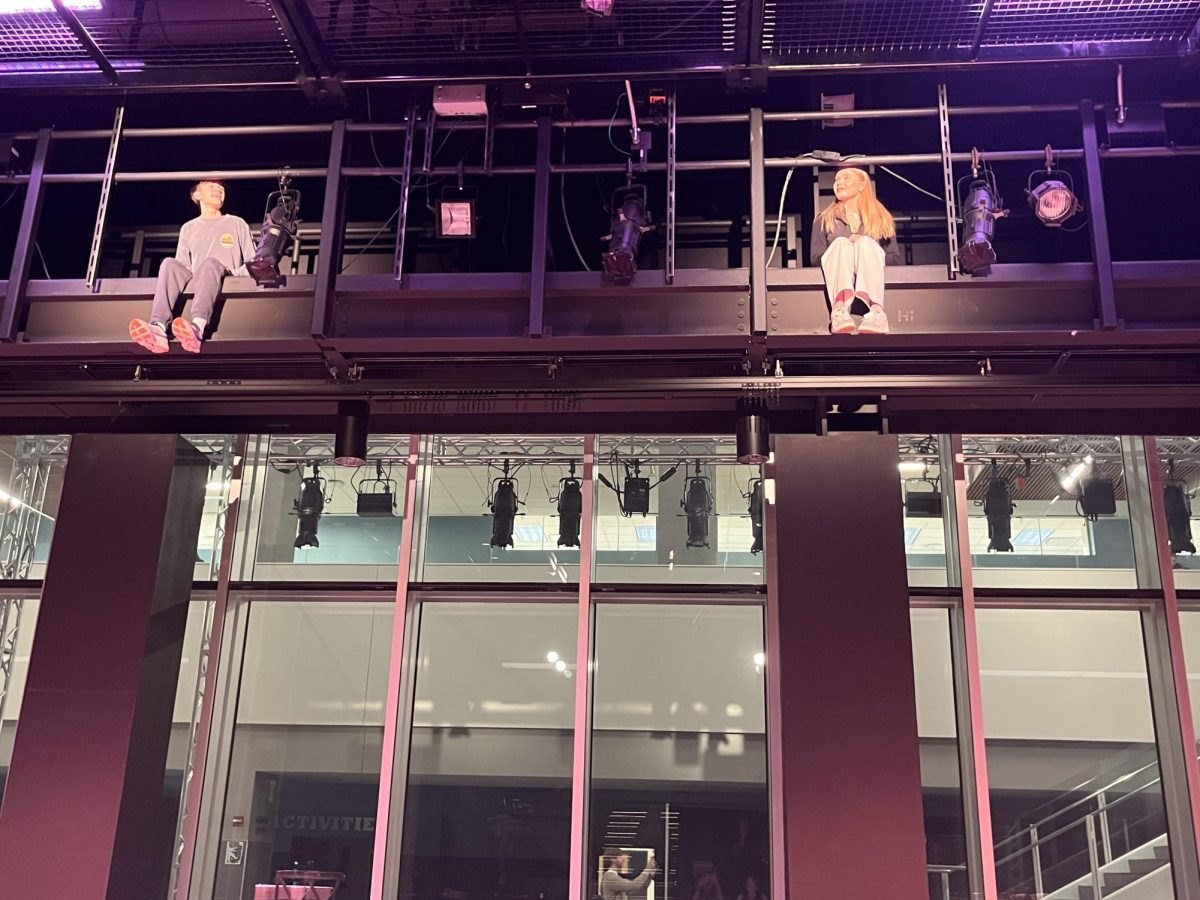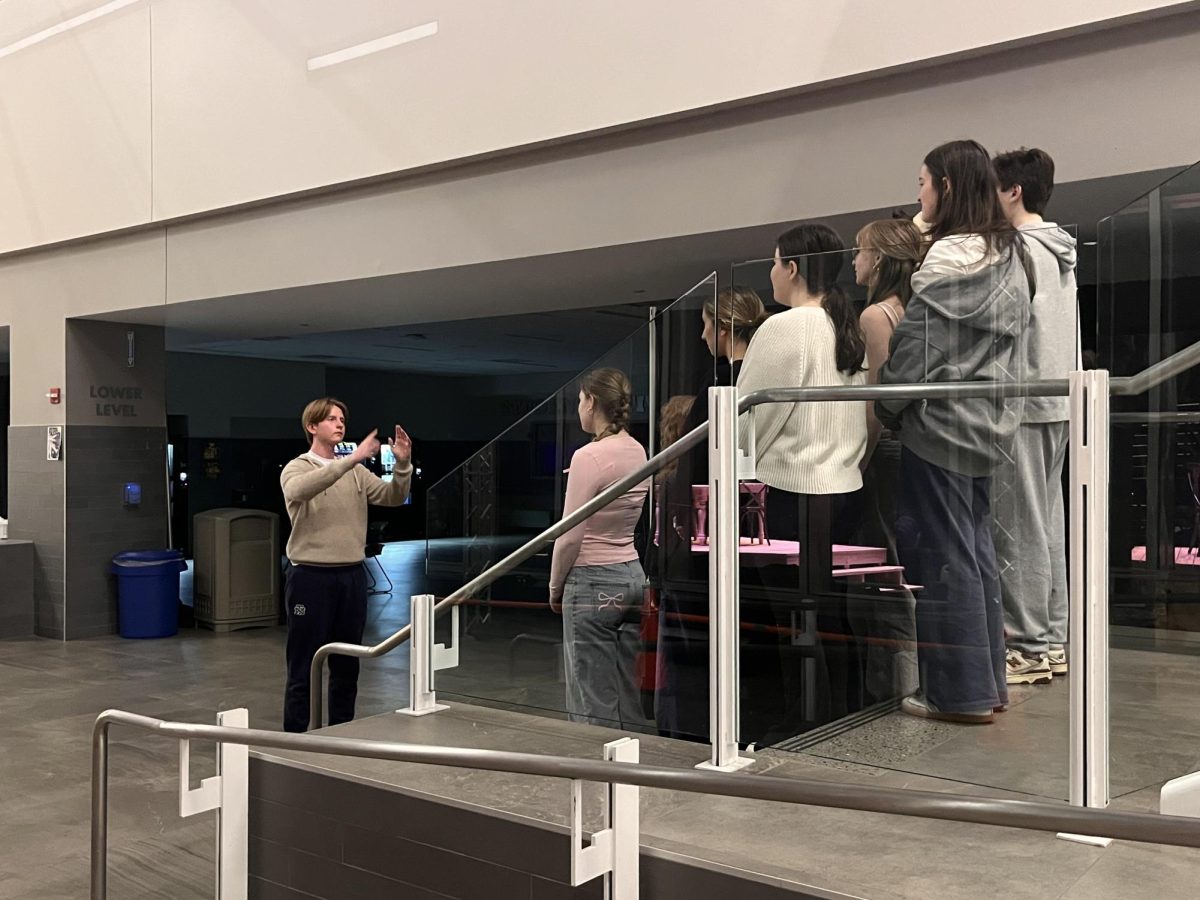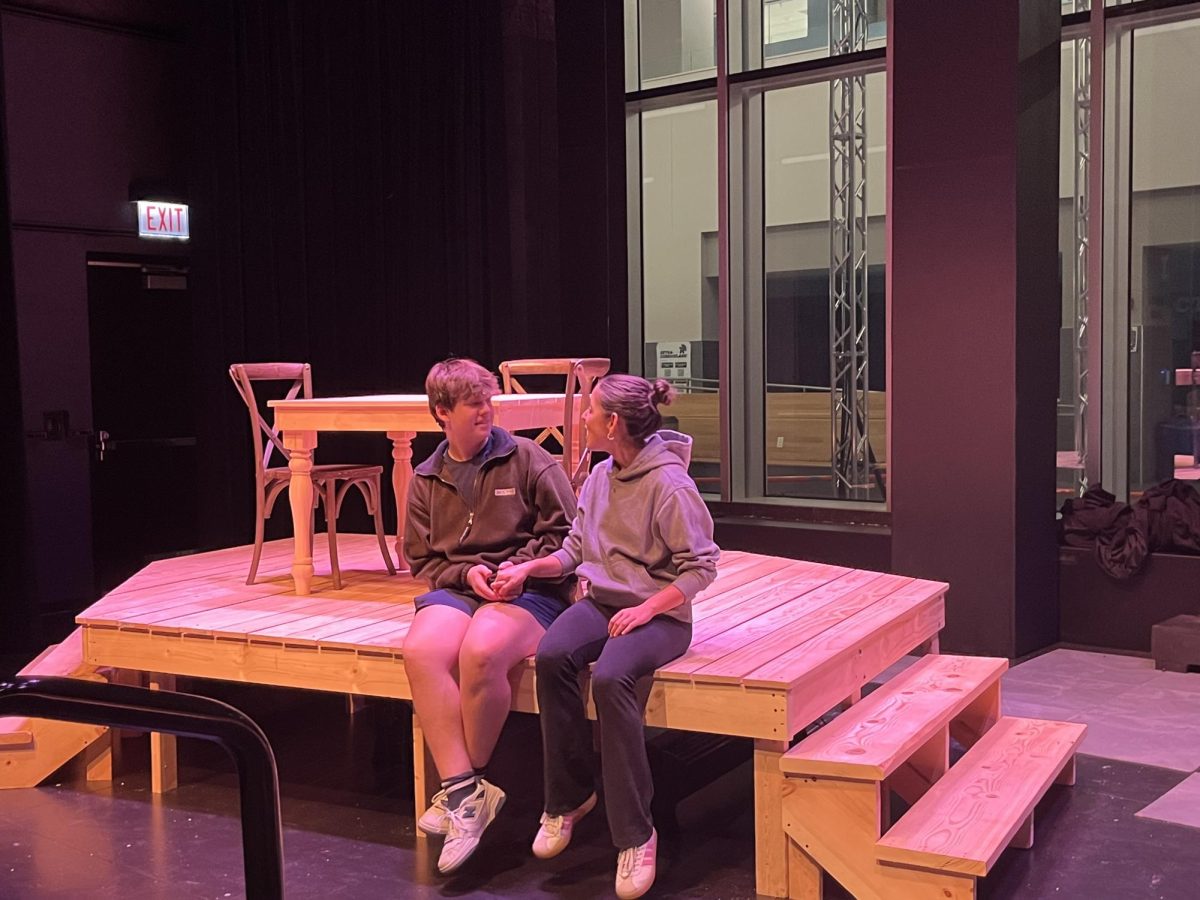If you’ve been lucky enough to attend a New Trier High School Performing Arts show, you should be able to confirm firsthand that the performances are nothing short of outstanding. Filled with talented students, experienced teachers, and committed directors, the shows never fail to impress, the high-performance quality producing a professional-like experience for the cast and the audience.
After rehearsals for New Trier’s winter play “Our Town,” written by Thornton Wilder in 1938, started Oct. 14, the cast and crew have been rapidly preparing for the show. Taking the audience back to the early 1900s, the story focuses on the little time we have on Earth, primarily following characters George and Emily in Grover’s Corners, New Hampshire as they grow up, fall in love, and go through life.
However, this production is far different from previous ones. Nina Lynn, the show’s director, a loved theater teacher, and Lagniappe-Potpourri sponsor, is retiring after 37 years at New Trier. This final show will act as a bookend on her time directing at New Trier as “Our Town” was also the first show she directed here in 1993, making the show an extra special moment for the cast and Lynn herself.
“This felt like a good way to sort of close the circle,” Lynn says. “Really, ‘Our Town’ is about the fleeting nature of our time together. The little miracles and little joys that happen every day, you can’t actually hold onto everything. So, you try to appreciate what you can. You try to take care of the people that you can and your time is finite. That resonated with me.”
Lynn started working at New Trier in 1992, but became familiar with the school’s theater program in 1987, working as a student teacher while studying at Northwestern University in Evanston, Illinois. Since then, Lynn has left a significant impact on the students in the program and has helped to craft a highly skilled and respectable performing arts community.
“The fact that she’s not going to be here next year is something I don’t even want to think about,” junior Mo Riley, “Our Town”’s rehearsal assistant, says. “She’s worked with so many kids to make their theater experience so much better. She’s left such a positive impact on the community.”
Lynn’s positive impact on the students and community she works with stems from her love of working with students, reflecting the immense amount of effort she puts in to ensure that each person feels seen and heard. Although she was originally supposed to work at the school for one year, 37 years later, she has proved her commitment and love for the program.

“I’ve had students who’ve gone off to be very famous and working as theater artists all over the place,” Lynn says. “But I’m just as proud of my students who just see theater or have become teachers or rabbis or doctors or moms and dads.”
Lynn believes that her students, all of them, have learned more about themselves through the theater community. She strongly feels that when her students leave New Trier’s theater program, they have developed the skills needed to persevere through life’s obstacles and have faith in themselves.
Although the theater program encourages students to explore their personalities and interests, training actors to truly embody their characters has been one of the most important pieces of the production process. The cast of “Our Town” has been working hard the past few weeks to get into their roles and transform their persona to fit the early 1900s. To get into the mindset of their characters, the cast will occasionally rehearse in button ups, heels, or skirts if that’s what their character would wear, trying to nail and become every aspect of their role.
“Watching the show, using outside resources, and researching about the time period, how people would talk, and the historical context of everything helps you get into the right mindset of how you should be playing the character and how to make it realistic to the time period,” junior Gauri Laroyia, the show’s narrator, says.
While transforming into a character and making it believable is difficult for any show, “Our Town” produces its own obstacles: the entire show will be done without props. While most productions at New Trier contain some sort of objects, the actors will pantomime all of their actions, such as making breakfast or passing things along.
“The actors have had to be just as specific,” Lynn says. “We’ve practiced with the actual objects and then we’ve taken them away.”
In addition to the unique blocking of the show, the performance will also be held in a rather creative location. The show will take place in the Hayes-McCausland Theatre, a black box theater, but is unconventional because it will extend into the atrium, known as the Scrounge. Behind the glass separating the two spaces will feature the houses of the town while the outside atrium will portray Main Street and the church.
“It fits really well with the show because in the third act, the main character comes back and relives a memory outside of the glass,” Laroyia says. “You’re almost there and you can almost feel it, but it’s not really real.”
The glass between the Scrounge and black box theater has recently been causing some minor problems in rehearsals, with cast members having a difficult time hearing each other. However, when everything is pieced together properly, the show should produce a seamless look, the audience being exposed to a much bigger stage than they thought possible.

Lynn played an important role in designing the Hayes-McCausland Theatre to help memorialize and honor Sarah McCasland and Mary Catherine Hayes in 2018. She worked with their parents in the process. She hopes to honor them while using the space to produce “Our Town,” a show celebrating the ups and downs of life.
“Those are two young women who died too early,” Lynn says. “[The show is] a love letter to the potential of that space for two young women who didn’t get a chance to live out to their full potential. All of this sounds very heavy, but for me, it’s a very joyous, full experience and I’m excited about it.”
The excitement and anticipation for such a meaningful, important show has brought the cast closer together. The rehearsal assistants start rehearsals by leading exercises to help get the cast into the right headspace, playing diverse and fun games such as Zip-Zap Zop and a southern-themed acting game. Bonding moments for the cast and spending time together is a big factor in fostering close communities that translate to real, authentic connections on stage.

“My favorite thing about rehearsal is just seeing everybody,” Riley says. “Working on something you like a lot and being with people who have similar interests and you’ve been close with for a couple of years is really rewarding.”
The welcoming community is a high value of the performing arts, and whether you have years of experience or are interested in starting, the theater community, although competitive, is looking to become a home for anyone.
“If you show up and you bring positive energy into the space, you are one of us,” Lynn encourages. “You are one of us. They’re kids of all different academic level assignments, they take all different kinds of classes, all different kinds of learning styles, all different kinds of personalities, genders, sexualities, races, religions. Because theater is about storytelling and understanding the perspective of others, they’re [theater students] incredibly empathetic.”
With the show rapidly approaching on Dec. 4-5 at 7 p.m., and Dec. 7-8 at 5 p.m., Lynn’s time directing at New Trier is coming to an end, but she is confident in the program’s future success and her students’ positive impact on the world.
“Whenever I’m feeling worried about our nation and our future, I look at my students and I’m like, ‘It’s going to be okay because you guys are great,’” Lynn says. “That’s a real gift of working with these kids.”
The show isn’t possible without an audience, and you don’t want to miss this production of “Our Town.” To purchase tickets, click here to be directed to New Trier’s theater homepage.
“Come see it, because after reading it, I had to just sit down and take it in, and that’s just me reading it,” Riley says. “One, it’s such an important member of the theater community’s last directing show, and two, it gets you thinking, which is really cool.”
This story was originally published on New Trier News on November 20, 2024.




































